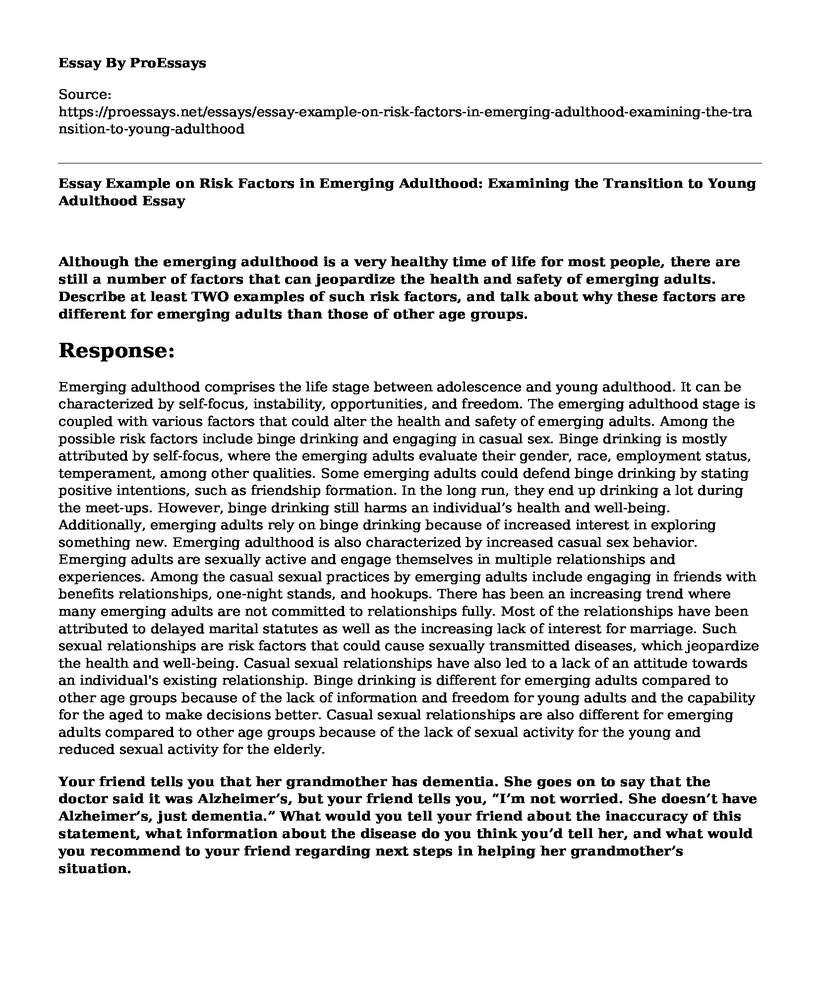Although the emerging adulthood is a very healthy time of life for most people, there are still a number of factors that can jeopardize the health and safety of emerging adults. Describe at least TWO examples of such risk factors, and talk about why these factors are different for emerging adults than those of other age groups.
Response:
Emerging adulthood comprises the life stage between adolescence and young adulthood. It can be characterized by self-focus, instability, opportunities, and freedom. The emerging adulthood stage is coupled with various factors that could alter the health and safety of emerging adults. Among the possible risk factors include binge drinking and engaging in casual sex. Binge drinking is mostly attributed by self-focus, where the emerging adults evaluate their gender, race, employment status, temperament, among other qualities. Some emerging adults could defend binge drinking by stating positive intentions, such as friendship formation. In the long run, they end up drinking a lot during the meet-ups. However, binge drinking still harms an individual’s health and well-being. Additionally, emerging adults rely on binge drinking because of increased interest in exploring something new. Emerging adulthood is also characterized by increased casual sex behavior. Emerging adults are sexually active and engage themselves in multiple relationships and experiences. Among the casual sexual practices by emerging adults include engaging in friends with benefits relationships, one-night stands, and hookups. There has been an increasing trend where many emerging adults are not committed to relationships fully. Most of the relationships have been attributed to delayed marital statutes as well as the increasing lack of interest for marriage. Such sexual relationships are risk factors that could cause sexually transmitted diseases, which jeopardize the health and well-being. Casual sexual relationships have also led to a lack of an attitude towards an individual's existing relationship. Binge drinking is different for emerging adults compared to other age groups because of the lack of information and freedom for young adults and the capability for the aged to make decisions better. Casual sexual relationships are also different for emerging adults compared to other age groups because of the lack of sexual activity for the young and reduced sexual activity for the elderly.
Your friend tells you that her grandmother has dementia. She goes on to say that the doctor said it was Alzheimer’s, but your friend tells you, “I’m not worried. She doesn’t have Alzheimer’s, just dementia.” What would you tell your friend about the inaccuracy of this statement, what information about the disease do you think you’d tell her, and what would you recommend to your friend regarding next steps in helping her grandmother’s situation.
Response:
I would tell my friend that the belief of seeing the diseases as synonymous is inaccurate. I would start by stating that Alzheimer's was the condition brought about by dementia. By saying that her grandmother had dementia, it would mean that her grandmother's mental ability was being interfered with daily. Besides, I would note that a lot of people who are already suffering from dementia have Alzheimer’s condition. Moreover, her age is also a risk factor in associating her condition with Alzheimer's. The situation worsens over time and is mostly associated with older adults of over 65 years of age. Additionally, with time and increased symptoms, patients with dementia are not informed of the conditions that could be causing the symptoms. Therefore, the doctor would not have concluded that it was Alzheimer's without assessing the underlying conditions. I would also note that by the doctor saying that one has Alzheimer’s condition, they were certain of the disease, especially if various tests were carried out. The statement from the doctor had already cleared any doubts between deciding for the grandmother’s condition. I would begin by advising my friend to have enough daily routine for her grandmother, where she could note important tasks, including medical appointments and recreation. A good routine would let her avoid unforeseen frustrations to her grandmother. I would also advise my friend to assist her grandmother in becoming more flexible by practicing independence. For instance, she could get her similar clothes if she is seen to practice the same pair over and over. Additionally, I would advise her to make sure that her grandmother lives in a safe environment because of the affected judgment and critical thinking. For instance, she could always check water temperature for her grandmother to prevent burns and always take precautions, including fire safety precautions.
Cite this page
Essay Example on Risk Factors in Emerging Adulthood: Examining the Transition to Young Adulthood. (2023, Sep 02). Retrieved from https://proessays.net/essays/essay-example-on-risk-factors-in-emerging-adulthood-examining-the-transition-to-young-adulthood
If you are the original author of this essay and no longer wish to have it published on the ProEssays website, please click below to request its removal:
- Nursing Case Study Discussion Board
- Research Paper on Respiratory Infections
- My Developmental and Health History Paper Example
- Essay Example on My Journey to Become a Qualified Nurse: A Passionate Student's Story
- Paper Example on Sibling Death in ICU: Problem Stated & Research Built
- Essay Example on Maintain Ideal BMI for Health: 3 Strategies
- Comprehensive Analysis of Project Needs and Costs - Essay Sample







